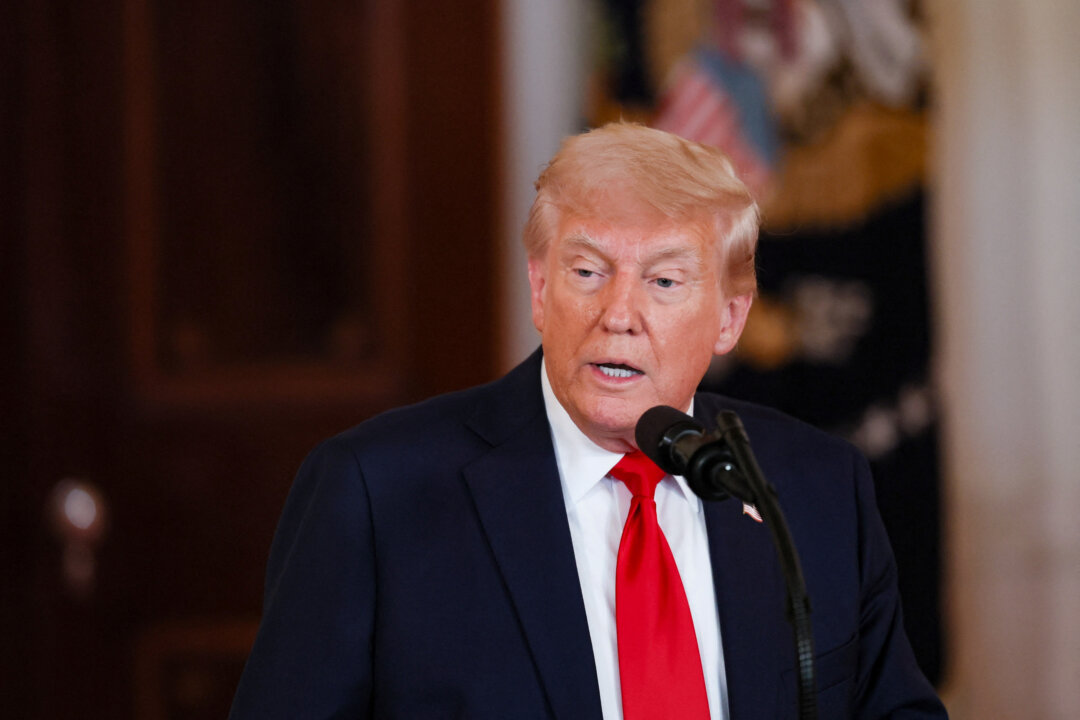The president told a town hall event that the United States was in a ’transition period’ following the imposition of tariffs and urged voters to be patient.
President Donald Trump on April 30 urged patience and trust in his tariff and trade policies, saying that rising prices and economic uncertainty reflect a necessary “transition period.”
Trump acknowledged during a town hall hosted by NewsNation that there was a “perception problem” with the tariffs, but he said he was still confident he could make the case for his trade policy to the American people: “I just think that I’ll be able to convince people how good this is.”
Earlier the same day, Trump received tough news on the economy. Data released by the Department of Commerce on April 30 showed that the U.S. gross domestic product (GDP) shrank at a 0.3 percent annual pace in the first quarter of 2025, or from January through March, representing the first drop in three years.
Following that news, Trump urged Americans to “be patient.” He repeated the sentiment during the town hall, saying, “It’s a transition period.”
The event commemorating Trump’s first 100 days in office featured anchors Chris Cuomo, Bill O’Reilly, and Stephen A. Smith. Trump called into the town hall via phone call. The discussion centered heavily around the barrage of tariffs Trump signed into law earlier this month.
On April 2, in what Trump dubbed “Liberation Day,” he signed tariffs against almost every U.S. trading partner, hitting adversaries like China the hardest. It fulfilled a campaign promise to his constituents, but has both the markets and many voters spooked.
“This is what other countries have done to us. We’ve been the laughing stock and the whipping post. We’ve been ripped off by every country, practically in the world, just ripped off on trade,” Trump said, echoing his campaign rhetoric toward the issue.
While lingering inflation was already a problem for many Americans, prices have risen further as a result of tariff costs being passed to consumers. Critics say lower and middle-income Americans are hardest hit by these rising prices.
Asked about that criticism by Smith, Trump argued that the poor and middle-class Americans will gain in the long run thanks to new job creation.
“It actually creates jobs for the middle income. It’s going to be better for the middle income. It’s going to save our country, because we’re going to become rich again, Stephen,” Trump said.
Reducing the trade deficit—the difference between the value of goods imported into the United States against those exported out of the United States—has long been a core pillar of Trump’s politics. In 2022, according to the federal Bureau of Economic Analysis, the U.S. trade deficit was $945 billion, meaning that nearly $1 trillion was flowing out of the country each year:
Trump has argued, and again reiterated the argument during the town hall, that tariffs such as those he imposed on April 2 are necessary measures to bring down this figure.
“We were losing $5 billion a day with this man that we had as a president,” Trump said. “We were losing $5 billion a day, and a big chunk of it was from China. Now, China is sending its boats back. The boats are not being unloaded because they have a 145 percent tariff, which is a record-setting type tariff.”
He’s referencing the current U.S. tariff rate on China. At 145 percent, China currently faces the highest U.S. tariffs, leading trade between the two nations to slow substantially.
Trump said that he’s unfazed by polls showing that voters are anxious about the economy.
“They’re fake polls,” Trump said. “And if you take a look at the polls … they interviewed more Democrats than they did Republicans.”
Trump emphasized that he was “flexible” on the tariffs, pointing to the move announced April 29 to temporarily suspend tariffs on certain raw materials and parts that car manufacturers in the United States rely on.

